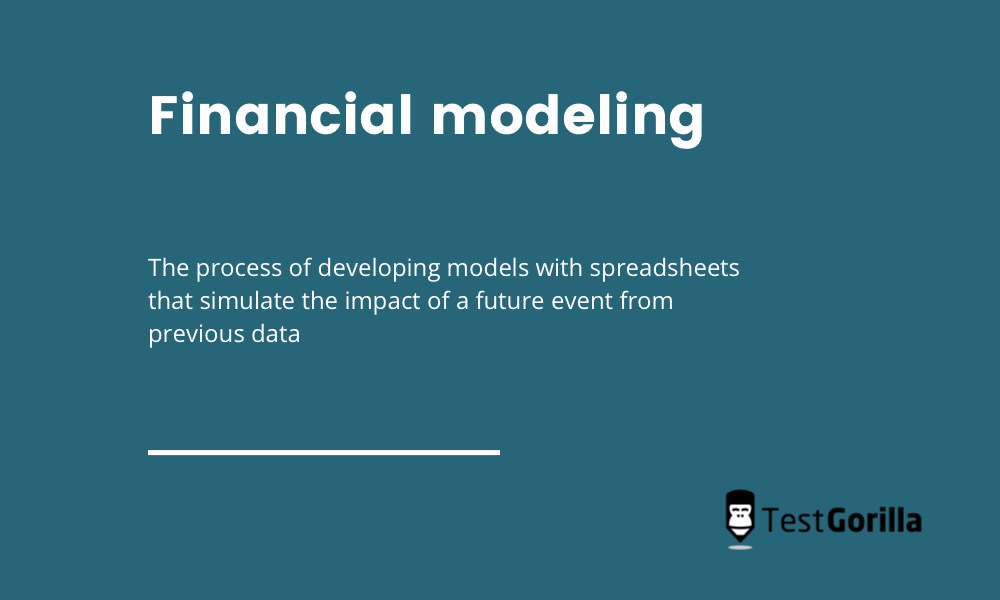New skillsets are changing finance recruitment
80% of finance employees prefer a skills-based hiring process (12 percentage points higher than the industry-wide average). Read the report to learn more.
Since 1978, financial modeling has played a vital role in enabling organizations to conduct thorough financial statement analysis and forecasting.
As such, it’s critical to evaluate this skill when recruiting financial analysts.
Financial modeling generally involves building models from a company’s historical financial data to assess its performance and bolster decision-making.
Essentially, your organization’s financial projections will depend on the quality of your financial model, so it’s important to choose your financial analysts carefully.
Hence, this article discusses the top financial modeling skills to look out for in applicants. It also highlights ways to evaluate these skills using a financial analyst Excel test.
If you’re ready, let’s begin.
What is financial modeling?
Financial modeling is the process of developing models with spreadsheets – like those in Excel or other software – that simulate the impact of a future event from previous data.
These models generally work on a three-way principle – input, calculation, and output.
We can liken this principle to a three-statement model comprising the following:
The income statement: a document showing a company’s revenue and its conversion into net income over a given period.
The balance sheet: a statement showing the balance of revenue and expenditure at a specific time factoring in capital, assets, and liabilities.
The cash flow statement: a financial statement showing the aggregate inflow and outflow of the business’s finances from its operations and investments during a given period.
These statements serve as the fundamentals for developing more sophisticated financial models, including Discounted Cash Flow (DCF) and Leveraged Buyout Models (LBM).
Financial modeling applies in various spheres of business. This four-decade-old concept is indispensable for successful organizations in most business sectors, from investment banking and corporate development to portfolio management and transaction advisory.
What makes a good financial model?
The quality of a financial model goes a long way in determining an organization’s strategic decisions.
Below, we highlight specific factors that constitute an effective financial model.
1. Structure
A good structure or layout enhances readability and allows analysts to glean information easily. Since big data is naturally cumbersome, a financial model reads better with proper organization.
2. Simplicity
Simplicity is key to ensuring comprehension. No matter how bulky the data may be, a good financial model must simplify complexities so that any reader can understand it without further explanation.
3. Quality of assumptions
Financial modeling requires realistic assumptions to properly evaluate a company’s performance in a given situation. Whatever the numerical inputs are, the assumptions must be appropriate to simulate a real event.
4. Flexibility
The flexibility of a financial model refers to the ease with which the model can undergo manipulation to predict diverse scenarios. Financial analysts should be able to modify the model utilizing different factors.
5. Visual output
As much as the focus is on the numerical inputs, a good financial model must be aesthetically appealing. The colors for different cells and data should harmonize to give an engaging visual statement while facilitating readability.
The best insights on HR and recruitment, delivered to your inbox.
Biweekly updates. No spam. Unsubscribe any time.
Top 7 financial modeling skills to look out for in applicants
When hiring a financial analyst, although your instinct may be to prioritize candidates with a solid finance background, the most important thing is to ensure they are suitably skilled for the job. The State of Skills-Based Hiring in Finance found that 94% of finance employers who use skills-based hiring improve retention, 94% improve diversity, and 90% reduce mis-hires.
Choosing the right skills to test for is crucial. Your focus should be on the following skills when conducting your next assessment.
1. Accounting
Financial analysts should have a firm foundational knowledge of accounting.
Understanding the three-statement model and applying generally accepted accounting principles (GAAP) is essential for financial analysts regardless of experience.
2. Analysis and foresight
Proper data analysis is all you need to make appropriate assumptions. Financial analysts should be able to extract, process, and make realistic inferences from their analysis.
Without foresight, it would be difficult to make accurate predictions to realize your business goals.
3. Attention to detail
It is almost impossible to have it all perfect when working with numbers, but accuracy is crucial in financial modeling. Therefore, financial analysts must have a keen eye and pay excellent attention to detail.
A slight error in your financial model can spell doom for your business in the long term.
4. Excel skills
Of the many tools available to build a financial model, Excel is the most flexible and customizable. Analysts must know how to execute the various Excel functions like SUM, AVERAGE, and COUNT to manipulate data.
5. Modeling skills
Financial analysts use several modeling types. The conventional ones include the three-statement, Discounted Cash Flow, Consolidation, and Leveraged Buyout model.
The best analysts must be able to employ any of these models when necessary to develop a reliable financial analysis of your business’ performance.
6. Presentation
Effective presentation skills are the icing on the cake after building a sound financial model. Hence, financial analysts should be able to communicate their findings and the measures they propose to implement.
As such, it’s crucial to conduct communication assessments. You want to ensure your financial analysts can effectively make proposals, secure investments, and walk your entire team through the development journey with effective communication.
7. Technology
Financial analysts must remain up to date with the trending technologies in the field. Apart from Excel, System Analysis Program (SAP), Hyperion, QuickBooks, and even SQL are relevant tools with which financial analysts should be conversant.
How to test financial modeling skills
Once you’ve identified the top skills for financial analysts, you need to know how to evaluate them to find the perfect candidate for a role at your firm.
As such, it’s common practice to develop an assessment specifically for the role.
Thankfully, TestGorilla’s Financial Modeling in Excel test is an effective assessment tool developed precisely for this purpose. It enables you to evaluate technical skill levels, predict job performance, and hire without bias.
One central reason for assessing financial modeling skills in this way is to eliminate interviewer bias.
As a result, you can ensure that your hiring process is sufficiently objective to enable you to make the best selection.
Sign up today with TestGorilla and make your recruitment process seamless, effective, and bias-free.
Related posts
You've scrolled this far
Why not try TestGorilla for free, and see what happens when you put skills first.


















